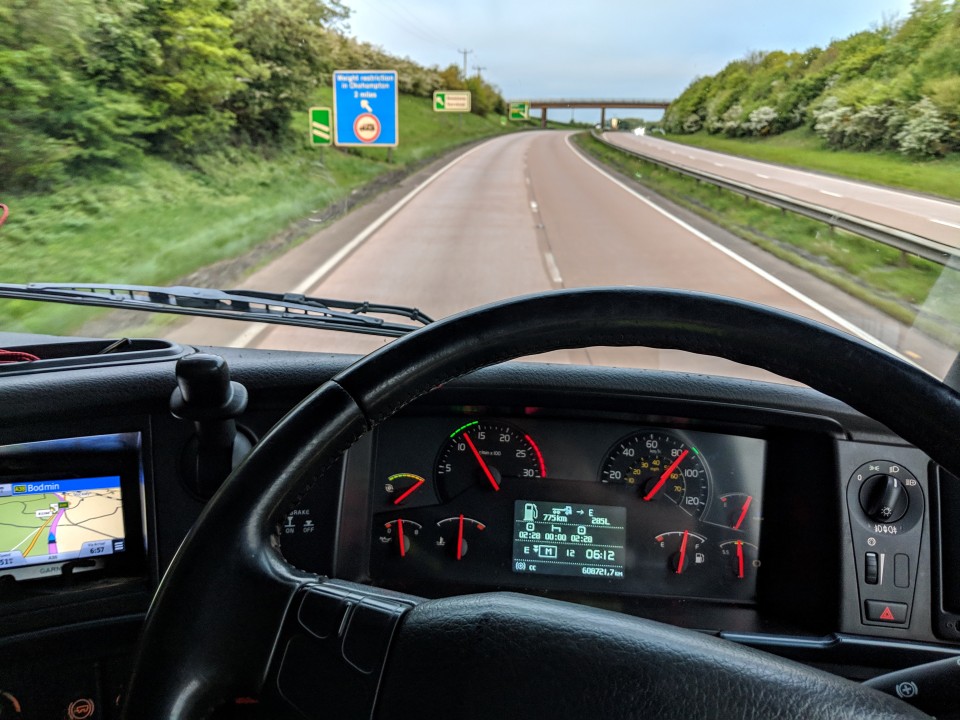
Susie Jones
Ist Ihnen auf der Straße langweilig?
Erstellt: 27.08.2024
•
Aktualisiert: 27.08.2024
Der durchschnittliche Lkw-Fahrer verbringt jeden Tag etwa 12 Stunden hinter dem Steuer. Die endlose Zeit auf offener Straße mag verlockend klingen, doch die Realität ist ein krasser Gegensatz. Unzählige Tankstellen, Rastplätze und lange Arbeitszeiten können ermüdend wirken. Lkw-Fahrer verbringen ihre Ausfallzeiten oft fern von zu Hause, und es kann schwierig sein, Langeweile zu vermeiden.
Die jüngste Umfrage von Convoy ergab, dass Langeweile eine der größten Herausforderungen für Lkw-Fahrer ist. Welche Auswirkungen hat Langeweile auf das Wohlbefinden der Fahrer? Und wie können Lkw-Fahrer sich unterhalten lassen?
Wie Langeweile das Wohlbefinden der Fahrer beeinträchtigt
Müdigkeit, Isolation, Einsamkeit und ein Mangel an geistiger Anregung sind häufige Probleme für Autofahrer. Manche Fahrer begegnen diesen Sorgen mit ungesunden Bewältigungsmechanismen - wie übermäßigem Essen, Rauchen oder übermäßigem Koffeinkonsum. Mit der Zeit können sich diese Gewohnheiten negativ auf die geistige Gesundheit auswirken.
Da sich jedoch die Diskussion über die psychische Gesundheit verbessert, gehen immer mehr Fahrer einen anderen Weg, um dem entgegenzuwirken. Wir haben Lkw-Fahrer auf Facebook gefragt, was sie tun, wenn ihnen langweilig ist.
"Hörbücher, hauptsächlich Psychologie. Musik, Gespräche mit geliebten Menschen oder Radiohören. Oder ich schalte alles aus und führe ein friedliches Dasein mit meinen eigenen Gedanken", sagt Nigel.
Andere haben berichtet, dass ihnen Gespräche mit ihren Angehörigen am Telefon geholfen haben. Ashleigh erklärt:
"Mit meinen Freunden in einem Gruppenchat reden. Ehrlich gesagt, wenn ich die nicht hätte, hätte ich schon lange aufgehört. Auf der Straße gibt es viel Mist, und ohne Gespräche mit wirklich guten Freunden hätte ich das nicht überlebt."
Ebenso ist Karl der Meinung, dass ein "Gruppenchat mit Freunden ein Muss" ist.

Langeweile am Steuer verhindern
Entgegen der landläufigen Meinung ist der Lkw-Verkehr eine körperliche Anstrengung - die Fahrer brauchen Koordination und Konzentration, um Unfälle zu vermeiden. Trotzdem kann es zu Ermüdungserscheinungen kommen, wenn man längere Zeit hinter dem Steuer sitzt. Es besteht die Gefahr, dass man bei der Arbeit selbstzufrieden wird, vor allem, wenn der Fahrer seine Route gut kennt. Wie können Fahrer mit Selbstzufriedenheit hinter dem Steuer umgehen?
Ob Podcasts oder Ohrwürmer - Autofahrer müssen sich für etwas entscheiden, das ihren Geist wach hält. Wir haben eine Liste mit Dingen zusammengestellt, die Langeweile am Steuer verhindern.
Podcasts: Lkw-Fahrer Marty hört während der Fahrt "Dutzende von Podcasts". Podcasts eignen sich hervorragend, um Abwechslung in den Alltag zu bringen und etwas Neues zu lernen. Sehen Sie sich diese nützliche Liste von Lkw-Podcasts
Musik: "Musik, Musik und Musik" ist Richards Mittel gegen Langeweile. Ob beim Radiohören oder beim Mitsingen zu einer Playlist - Musik ist ein hervorragendes Mittel, um den Geist wach zu halten
Machen Sie eine Pause: Obwohl die Fahrer strenge Fristen und Fahrtenschreibervorschriften einhalten müssen, hilft ein Ausstieg aus der Kabine, wenn Langeweile aufkommt, den Geist neu zu konzentrieren.
Langeweile während der Ausfallzeit
Trucker stehen vor zusätzlichen Herausforderungen, um sich nach ihrer Schicht zu unterhalten. Ein proaktiver Ansatz, um Langeweile während dieser Zeit zu vermeiden, ist unerlässlich. Wir haben eine Liste von Möglichkeiten zusammengestellt, wie man sich die Stunden vertreiben kann.
Standort: Raststätten, die ein breites Spektrum an Einrichtungen und ein Gemeinschaftsgefühl bieten, sind ein hervorragendes Mittel, um Langeweile zu vertreiben. Einige fungieren als soziales Zentrum, in dem Trucker ähnliche Erfahrungen austauschen können. Besuchen Sie unsere Seite [Standorte] (https://www.snapacc.com/locations/?lang=EN), um zu sehen, welche Einrichtungen unsere SNAP-Servicepartner anbieten
Sport treiben: Ein täglicher Spaziergang oder ein kreatives Workout verhindern Langeweile und sorgen dafür, dass Sie fit und gesund bleiben. Sehen Sie sich unsere Tipps an, um unterwegs gesund zu bleiben
Streaming-Dienste: Schauen Sie sich die neueste Fernsehsendung an oder scrollen Sie durch die sozialen Medien. LKW-Fahrer Steve "scrollt und kommentiert gerne auf Facebook und schaut Netflix", um sich die Zeit zu vertreiben
Hobbys: Die Möglichkeiten sind endlos. Ein Instrument erlernen, eine Fremdsprache lernen, zeichnen, schreiben und vieles mehr. Die Aufnahme eines Hobbys ist ein wirksames Mittel gegen Langeweile
Kochen: Das Kochen von Mahlzeiten in der Kabine hat viele Vorteile. Es verhindert nicht nur Langeweile, sondern spart auch Geld und ist gesünder
Bleiben Sie mit Ihren Lieben in Verbindung: Die Ausfallzeiten eines Truckers bieten die perfekte Gelegenheit, mit den Menschen in Kontakt zu treten, die ihm am nächsten stehen. Videoanrufe sind ein effektiver Weg, um sich Familie und Freunden näher zu fühlen
Entspannen: Lkw-Fahrer sind oft mit stressigen Situationen konfrontiert. Sich nach einer Schicht vollständig zu entspannen, kann das Wohlbefinden des Fahrers verbessern. Entspannungstechniken wie tiefe Atemübungen und Meditation bauen Stress ab.
Obwohl einige Fahrer die Einsamkeit und Unabhängigkeit genießen, die die offene Straße bietet, ist die Bekämpfung der Langeweile für viele eine Herausforderung. Aufgrund der Beschaffenheit des Berufs erleben Lkw-Fahrer oft lange Phasen der Langeweile. Um das Wohlbefinden, die Arbeitszufriedenheit und die Sicherheit im Straßenverkehr zu verbessern, müssen sie jedoch Wege finden, um diese zu lindern. Ob es nun darum geht, sich auf die anstehende Aufgabe zu konzentrieren, Radio zu hören oder mit Freunden und Familie zu plaudern - die meisten Lkw-Fahrer finden eine Lösung, die ihnen hilft.

Wo schlafen die Lkw-Fahrer?
Die meisten Fahrer schlafen in ihren Kabinen, da diese für eine angenehme Nachtruhe gut ausgestattet sind. Eine einfache Schlafkabine verfügt über ein Bett, Stauraum, Licht und Steckdosen und ist somit ein Zuhause fernab der Heimat.
Aufgrund der derzeitigen Parkplatzknappheit in Europa parken viele Autofahrer in Parkbuchten. Dies gilt als unsicher und macht den Fahrer anfällig für Diebstähle. Ab November 2017 müssen Lkw-Fahrer im Vereinigten Königreich regelmäßig wöchentliche Ruhepausen auf ordnungsgemäßen Rastplätzen (wie Raststätten und Autohöfen) einlegen.
Das SNAP's Depot Parking ermöglicht es Fuhrparks, ihre Lkw-Parkplätze dem Netzwerk zur Verfügung zu stellen, um den Mangel zu lindern und Fahrern zu helfen, gefährliche Situationen zu vermeiden. Darüber hinaus bietet SNAP über 450 Servicepartner in ganz Europa, bei denen die Fahrer parken können. Besuchen Sie unsere Kartenseite, um mehr zu erfahren.
Warum lassen Lkw-Fahrer die Türen ihrer Anhänger offen?
Wenn Sie schon einmal nachts eine Hauptstraße entlanggefahren sind, haben Sie vielleicht Lastwagen gesehen, die mit offenen Anhängertüren geparkt waren. Viele Fahrer tun dies, um Diebe abzuschrecken. Sie gehen davon aus, dass es nichts zu stehlen gibt, wenn die Anhängertür offen ist. Dies wird vor allem bei Anhängern mit Schiebegardinen gemacht, da es Diebe daran hindert, die Gardine aufzuschlitzen, um zu sehen, was sich darin befindet.



